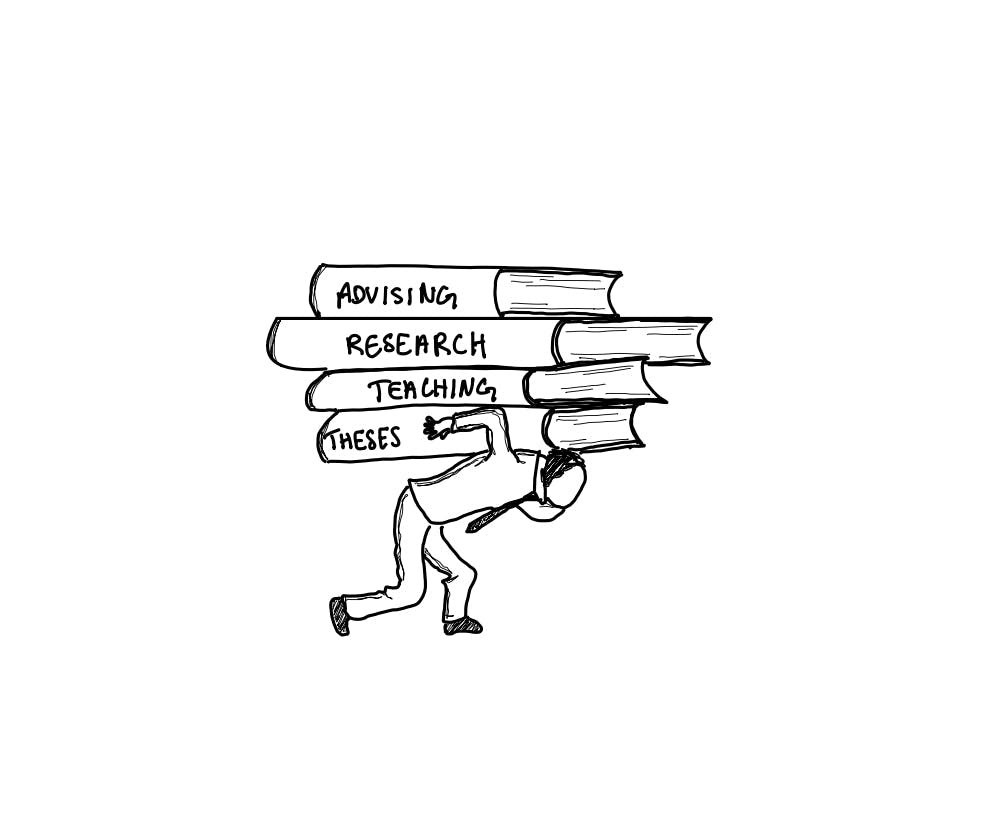This week, Middlebury’s chapter of the AAUP published an op-ed in The Campus calling for a 10% faculty wage increase, which they state is still less than the 16% they would be granted if raises were correctly adjusted for inflation. They note that “not investing in employees is a short-sighted strategy that will save some money now, but cost the College much more in the future.”
This begs the question, what does it mean to truly invest in employees and where is Middlebury falling short? The AAUP has outlined demands for fair and equitable compensation in line with higher costs of living, which we as a board stand behind. But wages are far from the only burden professors are being asked to shoulder. We as students may not fully understand the fiscal intricacies of what constitutes competitive faculty pay, but we can see other ways that professors are struggling, which in turn affects us as students.
One focal aspect of this is severely overenrolled classes, with waiting lists that often match the size of the course itself. In a Twitter reply, AAUP President and Gender, Sexuality, and Feminist Studies professor Laurie Essig estimated that each additional student enrolled in her courses amounts to ten hours of labor per semester.
To understand the scale of crowded classrooms, consider this semester’s Intro to Religion course. (For context, there are only 13 currently registered religion majors.) This class, which had 32 students in Spring of 2021, now has nearly double that amount at 63 students. In addition, one editor noted that the senior seminar course in his major — intimate and discussion-based in theory — has to bring in chairs from other classrooms as the enrollment is double what it was when it was taught last year. Many other editors stated that their professors were asking students to drop their course if it wasn’t absolutely necessary for them to take it so that students required to take the course — such as majors — could get in.
As students, we’re usually too preoccupied with the anxiety-inducing reality of not getting into classes to think about the undue burden over-enrollment puts on professors. However, first hand accounts of faculty burnout expressed by the AAUP make clear that students must rally behind professors, and not just because of what we’d gain from them having better pay, manageable class loads and generally higher satisfaction rates.
In addition to overenrolled courses, many seniors are struggling to find thesis readers if faculty who do research within their interest area are too overwhelmed with other responsibilities. As a result, some are ending up with third or fourth choice thesis advisors who may not have a background in that subfield. For example, the five senior art history thesis writers this term were told to be conscious of professors’ workloads when choosing a topic. Multiple editors writing theses this semester noted how they felt limited due to a lack of available advisors.
These crunches, though, are far from the fault of the professors. “I can tell you without a doubt that faculty and staff are stretched extremely thin,” said Political Science Professor Kemi Fuentes-George, who noted that one reason for ongoing faculty departures is low morale. He also cited the exit of three Black female faculty and staff in 2020, which is critical to keep in mind when considering how burnout affects BIPOC, female and untenured faculty disproportionately.
On top of teaching and grading related stress, many students also utilize office hours to lean on their professors for non-academic support. However, taking on these mentoring roles in addition to teaching, research and serving on committees puts added pressure on professors, potentially leading them to feel as if they have to choose between their own mental health and that of their students.
The AAUP reminds us that these additional undertakings are generally not paid. They note that during the height of the pandemic, “many staff took on more work and tasks that were outside their job descriptions, especially when positions were cut or left unfilled, all without additional compensation.”
It is now clearer than ever that the college needs to pursue genuine investment in Middlebury’s faculty: committing to enrolling smaller incoming classes, hiring more professors in tenure-track positions and removing the 5% cap from the endowment to prevent ongoing wage theft. If this doesn’t happen, we will end up bearing the brunt of the costs the AAUP said would afflict the future down the line — that is, Middlebury is going to find itself with fewer and fewer professors to teach more and more students.



